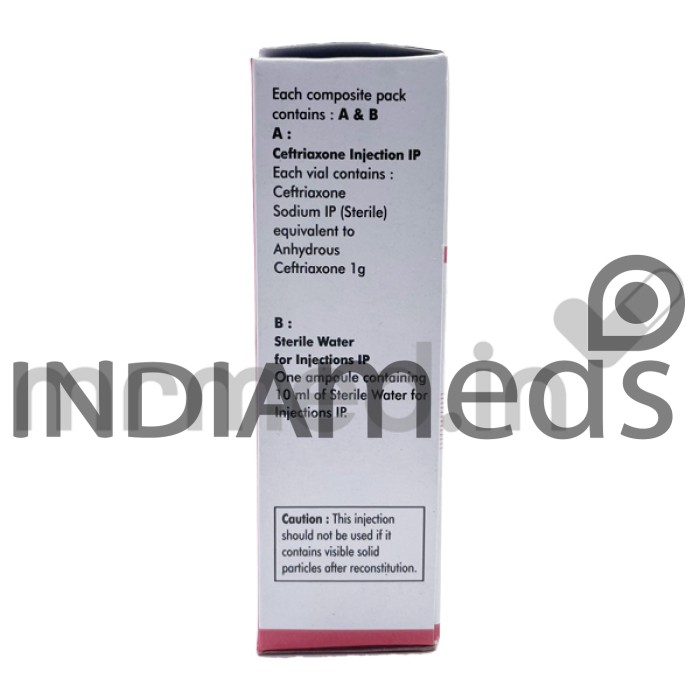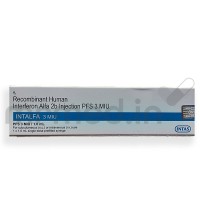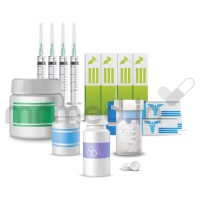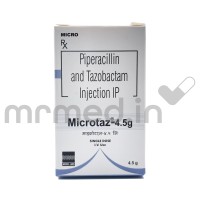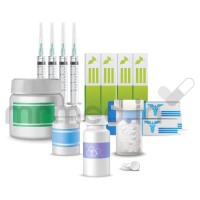Ritecef 1gm Injection is an antibiotic agent containing the active ingredient called Ceftriaxone. It belongs to a class of medications known as cephalosporins. This medicine is prescribed to treat a range of bacterial infections, including those affecting the brain (meningitis), lungs, middle ear, abdomen and abdominal wall (peritonitis), urinary tract and kidneys, bones and joints, skin or soft tissues, and blood-related infections. Additionally, this medicine can be given to sexually transmitted infections like gonorrhea and syphilis, helps when people with low immunity get infections and fever, treats chest infections in adults with chronic bronchitis, fights Lyme disease from tick bites in both adults and children, including newborns aged 15 days or older, and prevents infections during surgeries.
Do not take Ritecef 1gm Injection if you are allergic to Ceftriaxone, other beta-blockers, or any of its ingredients. Do not use this medicine if you have experienced a severe allergic reaction to penicillin or similar antibiotics (cephalosporins, carbapenems, or monobactams) or if you are allergic to lidocaine and are receiving the medicine as a muscle injection. Such reactions may include throat or facial swelling, difficulty breathing or swallowing, rapid hand, feet, or ankle swelling, and a sudden, severe rash. Always consult your healthcare provider before use. This medicine should not be administered intravenously to premature babies or newborns up to 28 days old who have specific blood issues, jaundice, or are receiving a calcium-containing product.
Before consuming Ritecef 1gm Injection, inform your doctor if you have recently used or will use calcium-containing products, experienced diarrhea after taking antibiotics, had gut issues like colitis, liver or kidney concerns, gall stones, kidney stones, low sodium diet, or a history of symptoms like rash, skin blistering, fever, flu-like symptoms, liver enzyme increases, or enlarged lymph nodes in response to medications.
Therapeutic Effects of Ritecef 1gm Injection
Pregnancy
Limited information is available on the use of Ritecef 1gm Injection during pregnancy. Notify your healthcare professional if you are pregnant or planning to have a baby think you may be pregnant. Your doctor will decide whether you should use this medicine.
Breast Feeding
Before starting the treatment, inform your doctor if you are breastfeeding. Your doctor must determine whether using Ritecef 1gm Injection while breastfeeding is safe.
Lungs
It is unknown whether Ritecef 1gm Injection is safe for patients with lung problems. Inform your physician if you have any lung disease before starting the treatment. Contact your doctor if you experience any lung-related symptoms.
Liver
Ritecef 1gm Injection should be used cautiously in liver patients. Before starting the treatment, inform your physician about pre-existing liver conditions.
Alcohol
It is unknown whether consuming alcohol while taking Ritecef 1gm Injection is safe. Please speak with your physician.
Driving
Do not drive or use machinery if Ritecef 1gm Injection makes you feel dizzy. If you experience dizziness, talk to your doctor.
Serious
- Severe skin reactions (rapid rash with blisters or skin peeling)
- Jarisch-Herxheimer reaction (fever, chills, headache, muscle pain, skin rash)
- High body temperature
- Liver enzyme elevations
- Blood abnormalities (eosinophilia)
- Enlarged lymph nodes and other body organs involvement
- Drug Reaction with Eosinophilia and Systemic Symptoms (DRESS or drug hypersensitivity syndrome)
Common
- Decreased white blood cells and platelets
- Loose stools or diarrhea
- Abnormal blood tests result for liver functions
- Rash
Before starting the treatment, inform your doctor about all the underlying medical conditions. Notify your doctor if you experience any serious side effects after taking Ritecef 1gm Injection. Contact your doctor for more information. It is highly advised not to skip the dose schedules as it may decrease the drug's effectiveness and increase the chance of bacteria developing resistance. It is generally suggested to complete the full treatment schedule as your doctor prescribes.
To manage the side effects of Ritecef 1gm Injection, follow the prescribed dosage and report side effects promptly. Stay hydrated and maintain a healthy lifestyle by following a balanced diet and attending follow-up appointments. Regular blood tests will be taken to monitor the function of your liver and to avoid the side effects.
Ensure that Ritecef 1gm Injection is stored out of sight and reach of pets and children. It should be stored below 25°C and should not be frozen.
Common side effects of Ritecef 1gm Injection include decreased white blood cells and platelets, loose stools or diarrhea, abnormal blood test results for liver functions Rash. It is crucial to consult your doctor for any concerns or persistent side effects.
Limited information is available on the use of Ritecef 1gm Injection during pregnancy and breastfeeding. Notify your healthcare professional if you are pregnant or planning to have a baby think you may be pregnant. Your doctor will decide whether you should use this medicine.
Ritecef 1gm Injection can affect the results of urine sugar tests and the Coombs test, which evaluates blood reactions. Regular tests help monitor your health and treatment progress.
| Molecule Name: Ceftriaxone | Therapeutic class: Antibiotic agent |
| Pharmacological class: Cephalosporins-blockers | Indications: Treats bacterial infection. |



